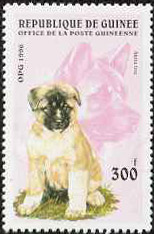
An experimental study of the effects of play upon the dog-human relationship
Effects of playing tug of war with Golden retrievers
source: Nicola J Rooney and John W.S. Bradshaw
Applied Animal Behaviour Science vol 75, 2002
starts p161, 16 pages long
Play is often seen as having a major effect on relationships between humans and dogs, and owners are often advised not to play competitive games with their dogs, and not to allow the dogs to win tug-of-war games. However, there is some evidence indicating that play behaviour reflects dominance relationships, rather than affecting dominance. Dominance refers to who seeks to gain control over access to resources, and this can vary from one resource to another, and is affected by context.
Golden retrievers were used in an experiment to see whether winning or losing tug games affected dogs’ relationships with humans. There were 11 bitches and 3 dogs in the sample. The 14 dogs were first rated for playfulness and dominance. The dominance tests included testing the dogs’ reactions to being called, asked to sit, being groomed, being stared at, and being told to give up a toy. Owners had trained their dogs to respond to the commands beforehand. The dogs were also tested for playfulness, and the four least playful were removed from the sample for some of the analysis. The dogs were divided into two groups, balanced according to how their owners rated them for playfulness and dominance, as well as sex and age. One group played 24 games where they won most of the time (at least two thirds wins), and the other group played 24 games where they lost most of the time. The groups were then tested for dominance and swapped roles, so the first group was made to lose, and the second permitted to win. Then the dogs were again tested for dominance.
All the dogs showed greater obedient attentiveness and demandingness after playing, though this could be because they had become more familiar with the experimenter, who was always the same person.
Dogs that were always allowed to win did not appear to increase their confidence and become more dominant, nor did dogs that were always made to lose decrease their confidence and become less dominant. However, dogs were more likely to show playful attention seeking if they were permitted to win, compared with when they were made to lose. They also showed a higher degree of involvement if they were permitted to win. Other studies using other animals show that they appear to enjoy playing more when they can win, and the dogs’ greater degree of motivation may help explain their seeking attention from their play partner after being able to win 20 times.
Play between animals of the same species tends not to affect dominance, and dogs tend to be less competitive toward humans when they play, than they are in games with other dogs. Some humans, and some dogs have difficulty in assessing whether interactions are play, and they need to be able to give out and understand play signals to do so. A dog that is unable to recognise play may become more dominant by being allowed to win tug games. It may be that only a small proportion of dogs are likely to become dominant, if allowed to win tug games. Other studies have looked at different breeds, and generally, playing tug does not appear to be linked to dominance.
DO,BT


